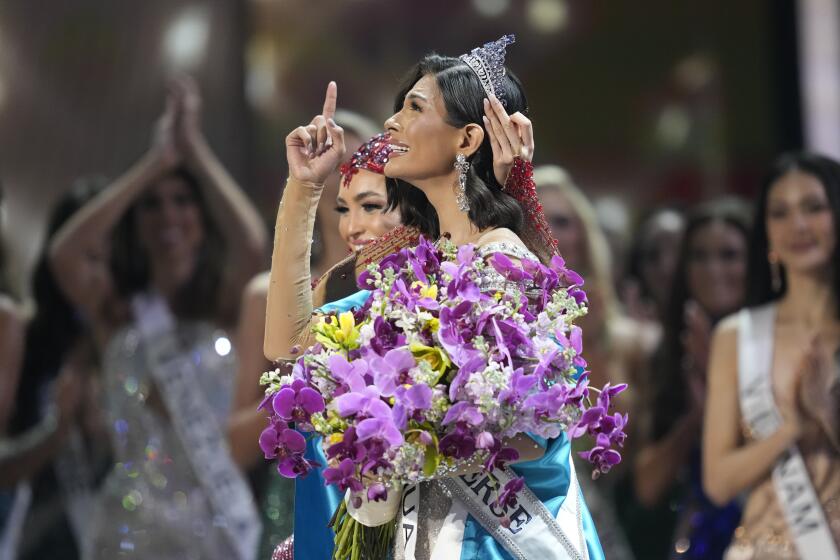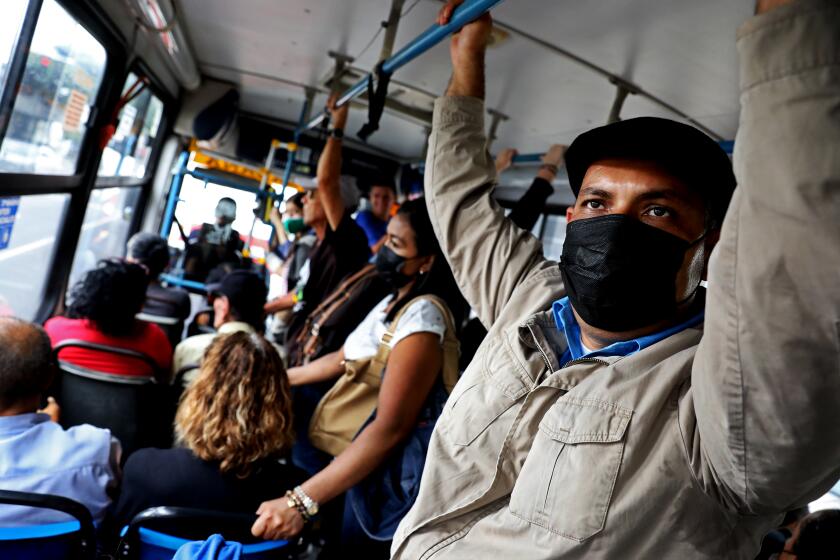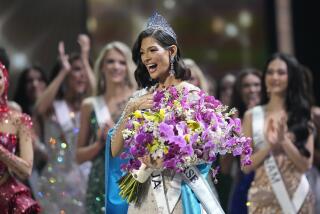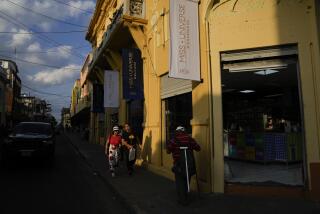Police accuse director of Miss Nicaragua pageant of rigging contests in a coup plot
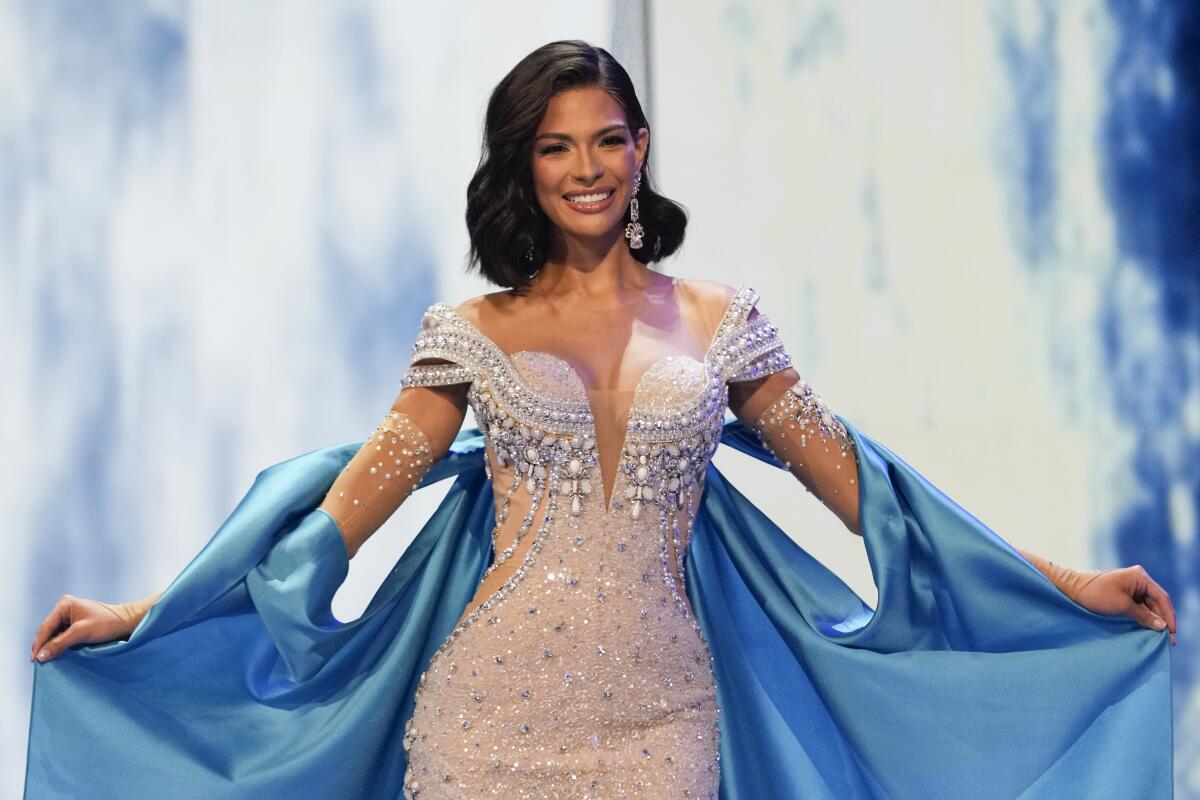
- Share via
MEXICO CITY — Nicaraguan police said they want to arrest the director of the Miss Nicaragua pageant, accusing her of intentionally rigging contests so that anti-government contestants would win the pageants as part of a plot to overthrow the government.
The charges against pageant director Karen Celebertti would not be out of place in a vintage James Bond movie with a repressive, closed-off government, coup-plotting claims, foreign agents and pageant queens.
It all started Nov. 18, when Miss Nicaragua, Nicaragua’s Sheynnis Palacios won the Miss Universe competition. The government of President Daniel Ortega briefly thought it had scored a rare public relations victory, calling her win a moment of “legitimate joy and pride.”
But the tone quickly soured the day after the win when it emerged that Palacios had posted photos of herself on Facebook participating in one of the mass anti-government protests in 2018.
The protests were violently repressed, and human rights officials say 355 people were killed by government forces. Ortega claimed the protests were an attempted coup with foreign backing, aiming for his overthrow. His opponents said Nicaraguans were protesting his increasingly repressive rule and seemingly endless urge to hold on to power.
A statement by the National Police Friday claimed Celebertti “participated actively, on the internet and in the streets in the terrorist actions of a failed coup,” an apparent reference to the 2018 protests.
Celebertti apparently slipped through the hands of police after she was reportedly denied permission to enter the country a few days ago. But some local media reported that her son and husband had been taken into custody.
Celebertti, her husband and son face charges of “treason to the motherland.” They have not spoken publicly about the charges against them.
The Nicaraguan government lauded Sheynnis Palacios’ crowning as Miss Universe, but it’s emerged that she apparently took part in 2018’s antigovernment protests.
Celebertti “remained in contact with the traitors, and offered to employ the franchises, platforms and spaces supposedly used to promote ‘innocent’ beauty pageants, in a conspiracy orchestrated to convert the contests into traps and political ambushes financed by foreign agents,” according to the statement.
It didn’t help that many ordinary Nicaraguans — who are largely forbidden to protest or carry the national flag in marches — took advantage of the Miss Universe win as a rare opportunity to celebrate in the streets.
Their use of the blue-and-white national flag, as opposed to Ortega’s red-and-black Sandinista banner, further angered the government, who claimed the plotters “would take to the streets again in December, in a repeat of history’s worst chapter of vileness.”
Just five days after Palacios’ win, Vice President and First Lady Rosario Murillo was lashing out at opposition social media sites (many run from exile) that celebrated Palacios’ win as a victory for the opposition.
“In these days of a new victory, we are seeing the evil, terrorist commentators making a clumsy and insulting attempt to turn what should be a beautiful and well-deserved moment of pride into destructive coup-mongering,” Murillo said.
With virtually no independent journalists left inside and foreign reporters banned from entering, Nicaragua has become ‘an information black hole.’
Ortega’s government seized and closed the Jesuit University of Central America in Nicaragua, which was a hub for 2018 protests against the Ortega regime, along with at least 26 other Nicaraguan universities.
The government has also outlawed or closed more than 3,000 civic groups and non-governmental organizations, arrested and expelled opponents, stripped them of their citizenship and confiscated their assets. Thousands have fled into exile.
Palacios, who became the first Nicaraguan to win Miss Universe, has not commented on the situation.
During the contest, Palacios, 23, said she wants to work to promote mental health after suffering debilitating bouts of anxiety herself. She also said she wants to work to close the salary gap between the genders.
But on a since-deleted Facebook account under her name, Palacios posted photos of herself at a protest, writing she had initially been afraid of participating. “I didn’t know whether to go, I was afraid of what might happen.”
Some who attended the march that day recall seeing the tall, striking Palacios there.
More to Read
Sign up for Essential California
The most important California stories and recommendations in your inbox every morning.
You may occasionally receive promotional content from the Los Angeles Times.
